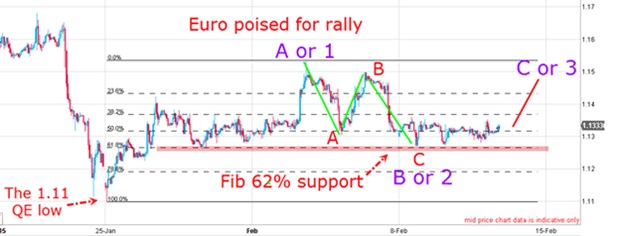Everyone is getting euro QE wrong
The best way to make money as a swing trader is to bet against conventional wisdom, says John C Burford.
Get the latest financial news, insights and expert analysis from our award-winning MoneyWeek team, to help you understand what really matters when it comes to your finances.
You are now subscribed
Your newsletter sign-up was successful
Want to add more newsletters?

Twice daily
MoneyWeek
Get the latest financial news, insights and expert analysis from our award-winning MoneyWeek team, to help you understand what really matters when it comes to your finances.

Four times a week
Look After My Bills
Sign up to our free money-saving newsletter, filled with the latest news and expert advice to help you find the best tips and deals for managing your bills. Start saving today!
I have a good friend who is a professional magician. He can do amazing things with playing cards, cups and balls, metal rings and chains, and ropes with knots. I can be standing right next to him, and he still fools me.
Of course, it is all illusion and sleight of hand. But even with that knowledge, I can still be fooled.
The markets work in the same way. They fool you into believing you understand them, and then they turn unexpectedly.
MoneyWeek
Subscribe to MoneyWeek today and get your first six magazine issues absolutely FREE

Sign up to Money Morning
Don't miss the latest investment and personal finances news, market analysis, plus money-saving tips with our free twice-daily newsletter
Don't miss the latest investment and personal finances news, market analysis, plus money-saving tips with our free twice-daily newsletter
Investors want to believe that they can figure out the market. They want to believe that with enough fundamental information about a company, for example, they can figure out where its share price is heading.
But the market doesn't work like that. The market doesn't behave predictably, like snooker balls on a table.
In the real world, markets are moved by changes in investor sentiment, as I have shown time after time in these posts. And these changes in sentiment are patterned according to the Elliott wave model.
The worst forecast of the last ten years
The conventional wisdom was very clear: it said that the dollar was going to plunge in value relative to currencies where QE was not operating.
So, what actually happened?
As the QE (money printing) got under way, the dollar started to rally, and today, it is up big time from the low. That wasn't in the script!
At the time, everybody else was concerned with the economics of money printing. But I was looking at the sentiment indicators, which measured how positive or negative traders were feeling. That gave me a much more reliable view of the market.
In 2008, bearish sentiment was at a record extreme. So the dollar had only one way to go up.
It's happening again this time with euro qe
At the moment, everyone is down on the euro. It's even being called a 'failed currency', as Greece eyes up the exits and the European Central Bank (ECB) begins its own money-printing programme.
But we've just seen how the conventional wisdom can be wrong at times such asthese. So is the euro set for a mammoth rally?
Just like with the dollar in 2008, a massive rally would fly in the face of conventional wisdom.
But as you know by now, trading against conventional wisdom is where the big profits are. Is it time to bet against the crowd, which believes the euro is about to fall?
Here is the hourly chart of EUR/USD going back to the low of €1.11 on the 25January this year:

If the market can punch above the 1.15 level, it should be off to the races and confound those who still believe QE is the kiss of death for a currency.
Get the latest financial news, insights and expert analysis from our award-winning MoneyWeek team, to help you understand what really matters when it comes to your finances.
John is is a British-born lapsed PhD physicist, who previously worked for Nasa on the Mars exploration team. He is a former commodity trading advisor with the US Commodities Futures Trading Commission, and worked in a boutique futures house in California in the 1980s.
He was a partner in one of the first futures newsletter advisory services, based in Washington DC, specialising in pork bellies and currencies. John is primarily a chart-reading trader, having cut his trading teeth in the days before PCs.
As well as his work in the financial world, he has launched, run and sold several 'real' businesses producing 'real' products.
-
 Should you buy an active ETF?
Should you buy an active ETF?ETFs are often mischaracterised as passive products, but they can be a convenient way to add active management to your portfolio
-
 Power up your pension before 5 April – easy ways to save before the tax year end
Power up your pension before 5 April – easy ways to save before the tax year endWith the end of the tax year looming, pension savers currently have a window to review and maximise what’s going into their retirement funds – we look at how